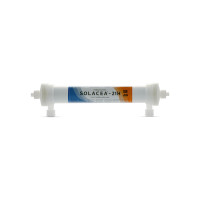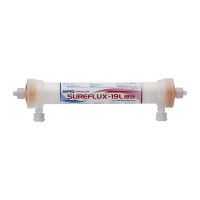

Allergic reactions are on the rise worldwide.
Once considered a rare disease, today more than 150 million Europeans suffer from chronic allergies. The current prediction is that half of the entire EU population will be affected by an allergy by 2025.1

Allergic reactions during hemodialysis
Allergens
Allergic reactions are commonly caused by food, medication, pollen, animal dander, insect stings, and latex. But for dialysis patient, an often overlooked trigger is the dialyzer.
For hemodialysis patients, an allergen that reportedly causes allergic reactions during dialysis is the synthetic dialyzer membrane.2
Symptoms
The symptoms of allergic reactions during hemodialysis can vary from itching (which impacts quality of life, but is relatively harmless) to cardiovascular collapse (which can become life-threatening).3
Impact on the hemodialysis practice
The reported prevalence of allergic reactions during and after hemodialysis treatment is estimated at more than 1 in 50 patients.4
These allergic reactions not only impact the treatment efficacy and quality of life for patients, but they also increase the workload and stress of healthcare professionals.

The prevalence of allergic reactions is thought to be underestimated
Not all patients report symptoms
17% of patients with severe pruritus did not mention it to their healthcare provider.5
Symptoms are not always recognized
In 69% of facilities, medical directors underestimated the prevalence of pruritus.5
Allergic reactions can be mistaken for:
- Symptoms of end stage renal disease6
- Side effects of hemodialysis treatment7
- Symptoms of other pathologies8,9
|
Symptoms of allergic reactions |
Symptoms of end stage renal disease |
Side effects of hemodialysis treatment |
|
Nausea and vomiting |
Nausea |
Nausea and vomiting |
|
Itching |
Itching |
- |
|
Dyspnea |
Dyspnea |
Dyspnea |
|
Abdominal cramps |
Pain, cramps, or numbness in legs or feet |
Abdominal cramps |
|
Hypotension |
Hypertension |
Hypotension |
Non-exhaustive list of symptoms associated with allergic reactions, end stage renal disease, and side effects of hemodialysis treatment6-9
Identifying an allergic reaction during hemodialysis can be a challenge
Allergic reactions during hemodialysis are easily missed or misinterpreted, as the symptoms may resemble end stage renal disease, certain side of effects of hemodialysis treatment, or other pathologies. Therefore, it is of the utmost importance to consider allergic reactions as a possible explanation for diseases symptoms, especially when other therapeutic options are not working.
Don’t let your patient be the 1 in 50 affected. Be aware of allergic reactions in your practice and opt for products that reduce the risk of allergic reactions in hemodialysis.

Quick access to download
Footnotes
-
European Academy of Allergy and Clinical Immunology (EAACI) https://www.eaaci.org/outreach/public-declarations.html
- Martin-Navarro J, et al. Kidney Blood Press Res. 2019;44(5):907-914.
- Alvarez-de Lara MA, et al. Nefrologia. 2014 Nov 17;34(6):698-702.
- Esteras R, et al. Kidney Blood Press Res. 2018;43(5):1472-1478.
- Rayner HC, et al. Clin J Am Soc Nephrol. 2017 Dec 7;12(12):2000-2007.
- Sheila Johnston. 2016 Dec; 4(4): 72.
- Kuipers J, et al. BMC Nephrol. 2016 Feb 27;17:21.
- Mukaya JE, et al. BMJ Case Rep. 2015 Feb 18;2015. pii: bcr2014208591.
- Delgado Córdova M, et al. Nefrologia. 2018 May - Jun;38(3):329-330.



